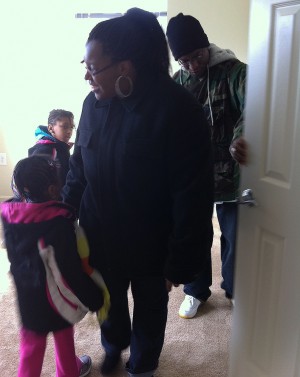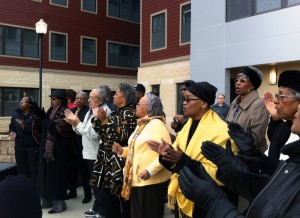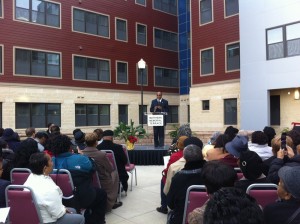Redeveloping Without Displacing: Affordable Housing Opens On Church Land

Elahe Izadi / DCentric
The Payton family tours its new home.
Tyisha and Antonio Payton were looking for a new home, something more spacious to accommodate their family than the two-bedroom, affordable housing apartment in Barry Farm they lived in.
Antonio Payton said he didn’t want to speak disparagingly of Barry Farm since “they housed us,” but said their former apartment was too small for his family. The appliances and apartment were outdated. And it didn’t feel like a safe environment where he could raise his three daughters.
On Tuesday, the family entered its new home at Matthews Memorial Terrace, a new $22 million, 99-unit affordable apartment complex built upon church land.
“This is a nice, secure building. It’s a whole different mindset,” Antonio Payton said. “I feel at peace here.”
It’s a unique project, built on land donated by Matthews Memorial Church at 2626 Martin Luther King Jr Ave, SE.
“This part of the city, and I live east of the river, has historically been ignored. It’s time for that to change, and it’s going to change because of developments like this,” Mayor Vincent Gray said at the Tuesday dedication of the building. “This development has been built with sensitivity to this community.”
The dedication ceremony was quite the celebration. It kicked off with a gospel choir, included some choked-back tears and plenty of praise and thanksgiving.
It’s been 28 years since the congregation first dreamed up the idea to use the land for housing. Bishop C. Matthew Hudson Jr., who took the helm of the church in 2006, said the project was a priority of his. The original intent was to provide seniors with homes near the church. He said “suburban flight” has taken many of his older congregants out of the community over the past few decades. “The church was preparing for that,” he said.
“We were a people of faith, land and a vision,” Hudson said during the ceremony. “We didn’t have any money, any experience in building.”

Elahe Izadi / DCentric
The Matthews Memorial Church Choir performs before the dedication of a new affordable housing complex.
A mix of public money and investment meant priorities had to be readjusted (that includes $6.8 million in federal stimulus funds). Now, one-third of the building is reserved for seniors, another third for Barry Farm residents and another third for those making up to 60 percent of the area’s median yearly income (which is $58,526 in D.C.). About 25 percent of the units are leased at the moment, according to Stephanie Anderson of nonprofit The Community Builders, Inc., the developer and property managers. Matthews Memorial Terrace became part of the the D.C. government’s New Communities Initiative, which seeks to improve affordable housing options while not displacing current residents.
Mayor Gray said the redevelopment of St. Elizabeth’s campus nearby will bring more than 3,000 new people into the area for work.
“A lot of people will want to live here, and we hope they do,” he said, adding that Matthews Memorial Terrace is an example of how to create opportunities for people to also remain in the neighborhood.
Ward 8 Councilman Marion Barry, who praised the project during the dedication ceremony, later said that increasing home ownership is the most sure-fire way to prevent displacement of residents since renters have little equity to tap into (he’s previously wanted to ban construction of apartments for this reason).

Elahe Izadi / DCentric
Bishop C. Matthew Hudson Jr. speaks in front of Matthews Memorial Terrace during a dedication ceremony Tuesday.
Tyisha Payton said she didn’t want to leave her neighborhood.
“With the children, to have to uproot? I don’t want to put them through that,” she said. “This way, they don’t have to change schools. And [my husband and I] don’t have to leave the friendships and bonds that we’ve made either.”
Life hasn’t been easy for the Paytons; in 2009, their baby son died, Tyisha said. The couple had spent most of their time in the hospital with him, while family members looked after the daughters. They couldn’t afford the home they were renting, and they eventually moved into subsidized housing Barry Farm.
“We were worried about being displaced to elsewhere in the city,” Antonio Payton said. “We’re actually moving into this place, and we’re still in this community.”
On Tuesday, the couple and their daughters — ages 2, 5 and 6 — stepped over the threshold to their new three-bedroom home. It had hardwood floors, new carpeting and energy efficient appliances. The girls timidly toured the rooms with their parents, until they discovered a large closet in one of them. “You get your own rooms,” Tyisha told them. The girls piled into the closet, opening and closing the door while giggling away.





